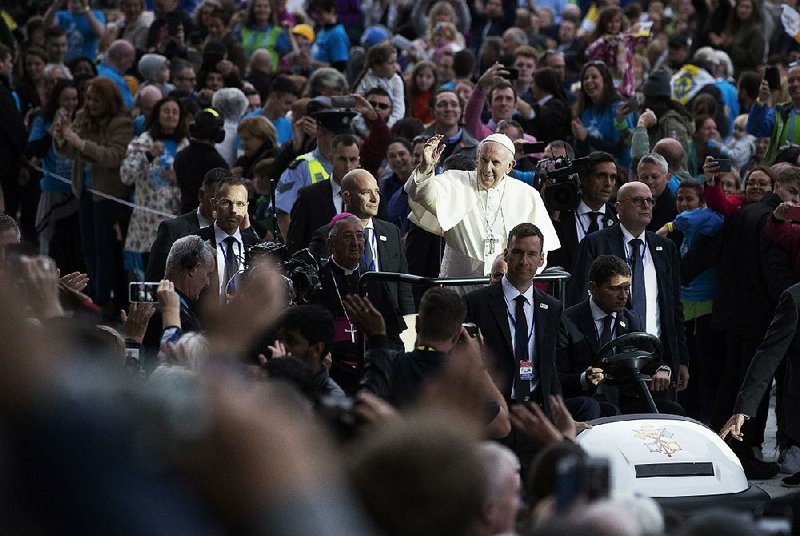DUBLIN -- Nearly 40 years since the last papal visit to Ireland, Pope Francis arrived Saturday to a transformed country where the once-mighty Roman Catholic Church is in tatters -- its authority eroded by deepening secularization and a global sex-abuse crisis.
With recent revelations of institutional cover-ups of sexual abuse in the United States and Chile, many Catholics had hoped that Francis would use the Irish church as a backdrop to announce muscular new measures to protect children.
Instead, on the first day of his two-day visit for the ninth World Meeting of Families event, he offered a familiar account of his disgust at the sins of priests and bishops, disappointing advocates of abuse survivors who found his remarks too tepid and disconnected from concrete plans to take action.
"I cannot fail to acknowledge the grave scandal caused in Ireland by the abuse of young people by members of the church charged with responsibility for their protection and education," Francis said at Dublin Castle. There, he met with Prime Minister Leo Varadkar, who called on Francis to use his "office and influence" to safeguard children in Ireland and around the world.
"The failure of ecclesiastical authorities -- bishops, religious superiors, priests and others -- adequately to address these repugnant crimes has rightly given rise to outrage and remains a source of pain and shame for the Catholic community," the pope added. "I myself share those sentiments."
Francis faced a lukewarm reception and scattered protests Saturday, with even his vow to rid the church of the "scourge" of sexual abuse and his anger at those "repugnant crimes" dismissed as a disappointment by some of Ireland's wounded victims.
Colm O'Gorman, who is leading a solidarity rally today in Dublin for abuse victims, said Francis' remarks about sharing the shame felt by Catholics were an "insult to faithful Catholics, who have no reason to feel shame because of the crimes of the Vatican and the institutional church."
Mark Vincent Healy, an Irish victim of clerical abuse, said Francis' speech to begin the trip was "empty -- really empty."
"I was with a group of survivors, and they were all upset with the statements as being ineffectual," he said.
Crowds did throng Francis' popemobile route and gathered outside Dublin's cathedral, and a stadium was nearly full for his evening vigil to close out the church's family rally.
Since the last papal visit to the country -- by John Paul II in 1979 -- Ireland, once a cornerstone of the church, has abandoned its teachings by legalizing divorce and same-sex marriage. The prime minister is gay, and just a few months ago, Ireland voted to lift a ban on abortion.
But the sex-abuse scandal has lent increasing urgency to the pope's visit.
It was only since January, during anger over his reflexive trust in a Chilean bishop and his doubting of Chilean abuse survivors, that Francis has begun to act more decisively, sending investigators, accepting resignations of top Chilean bishops and promising victims there would be further measures.
But more cases of abuse and cover-up keep coming to light.
The more than 1,000 cases of abuse discovered over 70 years in Pennsylvania; the accusations against Theodore McCarrick, former cardinal of Washington; and the cover-ups of abuse in Chile have all cast a pall over the pope's busy schedule and the triennial world meeting.
Before the trip, Francis made clear that he viewed the secrecy, ambition and self-preservation that came with a culture of clericalism -- priests who put themselves above their parishioners -- as the root cause of the crime.
"To say 'no' to abuse is to say an emphatic 'no' to all forms of clericalism," Francis wrote in a letter of apology to all Catholics this month.
Critics say that is not enough.
"The actions of the church do not match the words," Marie Collins, a former member of the Pontifical Commission for the Protection of Minors, said at the world meeting's panel on safeguarding children. "And in fact, they are totally opposite."
She called the pope's speech in Ireland on Saturday "disappointing -- nothing new."
PRAYER FOR VICTIMS
Francis on Saturday held a 90-minute meeting with eight survivors of both clerical and institutional abuse and prayed quietly before a candle lit for victims in Dublin's cathedral.
The Vatican did not release details about the meeting, but the gathering included Collins. At a panel discussion Friday, Collins called for the church to adopt a policy of immediately removing any priest found to have committed abuse.
"Sadly, more often canon law has been used to protect the abuser than punish him," Collins said.
Several of the victims who met with the pope in private left heartened that he would respond to their plight, including that of the thousands of children who were forcibly put up for adoption after being born to unwed mothers.
Two of the Irish adoptees said they were heartened that Francis said he would address their concerns at Mass today. They are asking him to publicly state that their mothers had done nothing wrong and to encourage reconciliation between all unwed mothers, many of them now aged, who were forced by society and the church to give up their children.
Information for this article was contributed by Jason Horowitz of The New York Times; by Nicole Winfield, Maria Grazia Murru and Luigi Navarra of The Associated Press; and by Chico Harlan and Amanda Ferguson of The Washington Post.
A Section on 08/26/2018

